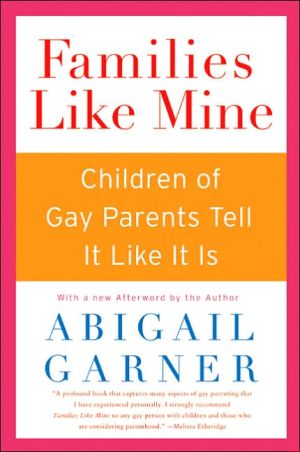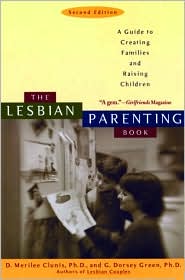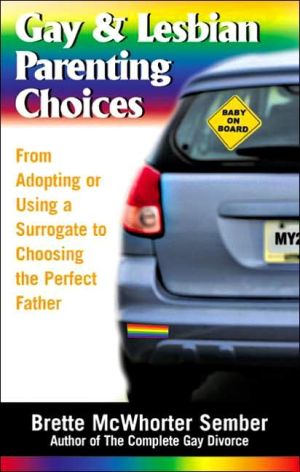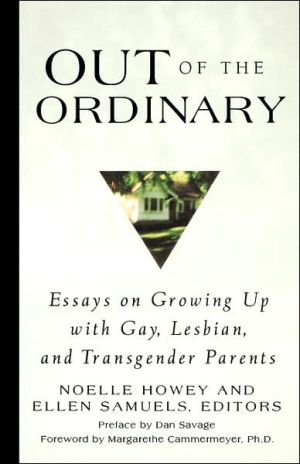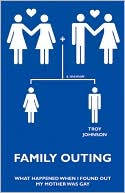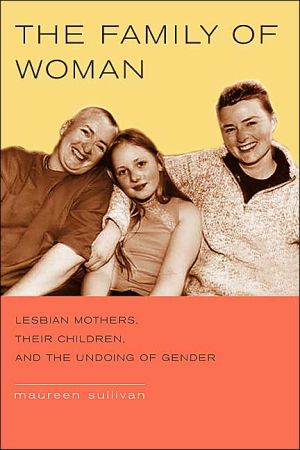Families Like Mine: Children of Gay Parents Tell It like It Is
Abigail Garner was five years old when her parents divorced and her dad came out as gay. Like the millions of children growing up in these families today, she often found herself in the middle of the political and moral debates surrounding lesbian, gay, bisexual, and transgender (LGBT) parenting.\ Drawing on a decade of community organizing, and interviews with more than fifty grown sons and daughters of LGBT parents, Garner addresses such topics as coming out to children, facing homophobia...
Search in google:
Abigail Garner was five years old when her parents divorced and her dad came out as gay. Like the millions of children growing up in these families today, she often found herself in the middle of the political and moral debates surrounding lesbian, gay, bisexual, and transgender (LGBT) parenting.Drawing on a decade of community organizing, and interviews with more than fifty grown sons and daughters of LGBT parents, Garner addresses such topics as coming out to children, facing homophobia at school, co-parenting with ex-partners, the impact of AIDS, and the children's own sexuality.Both practical and deeply personal, Families Like Mine provides an invaluable insider's perspective for LGBT parents, their families, and their allies. In the Family magazine “Garner moves the LGBT parenting dialogue into new territory.... Compassionate and insight[ful], a valuable resource for parents.”
Families Like Mine\ Children of Gay Parents Tell It Like It Is\ Chapter OneChildren of LGBT Parents:\ Growing Up Under Scrutiny\ It's hard to grow up under a microscope. As kids, we are expected to talk about very adult issues — sex, civil rights, legal and political issues. What other situations are there where people talk to kids and then legislate from there?\ — Jesse Gilbert, 30\ Many times throughout my life people have been shocked when they find out my father is gay. "I had no idea," they say. "You'd never know just by looking at you." They make me feel like a rare species as their eyes scan me for any abnormalities they missed that could have tipped them off. Ladies and Gentleman, step right up! Look closely at the child of a gay dad. No horns! No tail! In fact, she could pass for anybody's child.\ What do people think kids of LGBT parents "look" like? If they don't know any personally, they might believe the anti-gay rhetoric about why children shouldn't be raised by gay parents: it's abnormal, it's deviant; the children will grow up confused, lacking values and morals; the children will be recruited into homosexuality. This rhetoric is what stands in the way of LGBT parents gaining parental rights equal to those of straight parents.\ Every time religious leaders, conservative politicians, or even radio talk-show hosts express their homo-hostile opinions, children in these families cannot help but notice. In 2003, the Vatican released a document opposing gay marriage which stated: "allowing children to be adopted by persons living in such unions would actually meandoing violence to these children." This cruel allegation completely ignored the fact that there are children who are already in these families. These children were being told by a major world religion that being raised by their parents was "not conducive to their full human development."\ This Vatican statement is a recent and highly visible example of the homo-hostile rhetoric to which children of LGBT parents are subjected every day. When I was a child, I did not know other people who had gay parents, so when I consistently overheard homo-hostile opinions about gay people's kids being really messed up, even I wondered if it was true. I considered my brother and me to be fortunate for beating the odds and being raised by a normal gay dad, not like all those other gay parents who are detrimental to their children's well-being.\ Pervasive homo-hostile views are effectively countered by the increased visibility of LGBT families who are gradually shifting social attitudes about gay rights, same-sex marriage, and gay parenting. In March 2002, Rosie O'Donnell officially declared that she is gay in a television interview with Diane Sawyer on Primetime Thursday. Rosie's interview called attention to a law in Florida that bans gay people from adopting children. "I don't think America knows what a gay parent looks like," O'Donnell said. "I am the gay parent." The program, which also featured interviews with children adopted and fostered by gay parents, reached 14.4 million households. 4 Hardworking LGBT nonprofit organizations can only dream about having that kind of far-reaching impact in one night.\ Bringing LGBT parents and their children into the public eye is necessary for there to be mainstream awareness of LGBT families. These real families show the public that concerns about children raised in LGBT families are based on prejudice and homophobia. Florida's gay-parent adoption ban passed in 1977, but before the Primetime special aired, most people who attended my lectures were shocked to learn the law existed. Now when I refer to the law, more people in the audiences nod in recognition; introducing the personal impact of a public issue is what has made the difference.\ With conservative voices adamantly arguing that children are damaged by having parents who are gay, it is not surprising that more reasonable voices in the gay-parenting debate strive to demonstrate how "normal" these families are. At the same time, however, children with LGBT parents who see how they are represented publicly begin to internalize a paradox: to be accepted for being different, they first have to prove that they are "just like" everyone else. LGBT parents need to consider how this public discourse — both positive and negative — affects their children. Inevitably their children consume the same media, which in turn shapes how these kids think and feel about their own families.\ In the past few years several professional organizations have released statements of support for the rights of gay parents and their children. Among these organizations are the American Academy of Pediatrics, the American Psychoanalytic Association, the American Academy of Family Physicians, and the American Bar Association. Each statement makes a positive step toward acceptance for LGBT family rights, but they also reinforce to children how vulnerable their families currently are. The right for LGBT families to exist is the subject of debate, and children begin to figure out that the outcome of this debate rests on how they "turn out."\ One teen remembers being approached by a local TV station that wanted to interview her about "what it was like to grow up in a lesbian household." She laughed at the notion of her life being presented like an exposé. She ate cereal in the morning, went to school, studied music, did homework, and hung out with friends. "What is it," she wondered out loud, "that they think they will find in a lesbian household?"\ Even a well-meaning reporter who asks an eight-year-old, "What is it like having two moms?" suggests to the child that she should have a formed opinion about her family — something that other kids her age are not expected to do. When so many people are determined to find out what it is like to grow up in these families, a major part of the growing-up experience is the realization that how you turn out matters to more than just your own parents.\ Families Like Mine\ Children of Gay Parents Tell It Like It Is. Copyright (c) by Abigail Garner . Reprinted by permission of HarperCollins Publishers, Inc. All rights reserved. Available now wherever books are sold.
\ Melissa Etheridge"A profound book that captures many aspects of gay parenting that I have experienced personally. Strongly recommended."\ \ \ \ \ Candace Gingrich"Abigail Garner convincingly establishes LGBT families as vital, vibrant parts of our society. "\ \ \ Noelle Howey"In this warm, insightful book, Abigail Garner addresses the most challenging issues that arise among gay parents and their families."\ \ \ \ \ Esera Tualo"Families Like Mine does for LGBT families what And the Band Played On did for AIDS."\ \ \ \ \ In the Family Magazine"Garner moves the LGBT parenting dialogue into new territory.... Compassionate and insight[ful], a valuable resource for parents."\ \ \ \ \ Booklist"Compellingly written, this should quickly become a mainstay resource."\ \ \ \ \ Vanity Fair"Children of gay parents shoot from the hip in Abigail Garner’s indispensable Families Like Mine."\ \ \ \ \ Bitch Magazine"Garner is savvy and thorough…Families Like Mine has enough heart…to make it a must-read."\ \ \ \ \ In the Family magazine“Garner moves the LGBT parenting dialogue into new territory.... Compassionate and insight[ful], a valuable resource for parents.”\ \ \ \ \ Cleveland Plain Dealer"Perhaps the highest praise a book such as this can receive is to be called honest. And it is."\ \ \ \ \ The Advocate"Smart and impassioned... this is the new essential reading for LGBT families."\ \ \ \ \ Time Out New York"An instant classic."\ \
